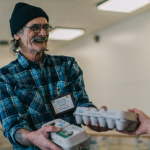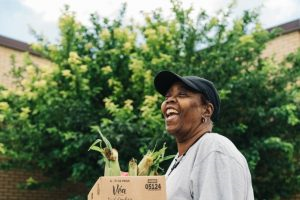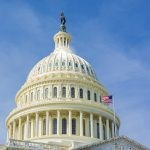Government Affairs & Advocacy Newsletter Update: July 2018
Government Affairs & Advocacy Newsletter Update: July 2018
BY JULY 23, 2018 – 7:45 PM HEALTH
By American Diabetes Association
Introduction from LaShawn McIver, MD, MPH
Dear Advocates,
What a busy year 2018 has been so far! In this summer’s Advocacy Newsletter, I’m excited to share updates from our teams in Federal Government Affairs, State Government Affairs, Legal Advocacy, Grassroots Advocacy and Public Policy. Together, these hardworking teams have made so much progress on the federal, state, and local level to intensify the urgency around the diabetes epidemic and ensure access to affordable and adequate health care for all people with diabetes. From securing renewed funding of the Special Diabetes Program, to ensuring states continue to offer health plans within the Affordable Care Act’s consumer protection rules, to answering questions about a person’s legal rights, the ADA has been working harder than ever to make our voices heard.
But they can’t do it alone—I would like to take this opportunity to say thank you to the dedicated Diabetes Advocates who stand alongside us every step of the way to support our mission. Together, we can transform the lives of all people with diabetes. I look forward to seeing what the rest of the year will bring!
From the Senior Vice President’s Corner
LaShawn McIver, MD, MPH
Government Affairs, Advocacy & Community Integrated Health
Federal Government Affairs
The federal government affairs team and our dedicated Diabetes Advocates have been busy promoting the need for increased funding for diabetes research and programs, advocating for access to affordable insulin, and defending the provisions of the Affordable Care Act (ACA) that benefit people with diabetes.
Insulin Affordability
A major highlight of the past several months was the testimony of William T. Cefalu, MD, the ADA’s Chief Scientific, Medical and Mission Officer, before the U.S. Senate Special Committee on Aging to call for increased transparency in the insulin supply chain and affordable insulin for all who need it, and to discuss the Insulin Access and Affordability Working Group: Conclusions and Recommendations white paper and the ADA Public Policy Statement: Insulin Access and Affordability. To keep apprised of ADA’s work on this critical issue, please visit makeinsulinaffordable.org, where more than 355,000 advocates have signed our petition calling for increased affordability.
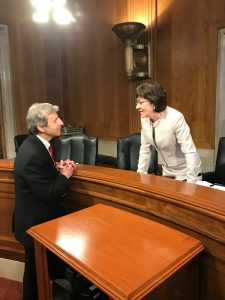
Affordable Care Act
On June 14, the ADA signed on to an amicus (friend of the court) brief defending the ACA against a lawsuit challenging the constitutionality of the law. An amicus brief is filed by an individual or entity that has an interest in a court case, and the brief shares expertise or information pertaining to the case that will assist the court in making its decision. Back in February, 20 states led by the Attorney General of Texas filed a lawsuit against the federal government challenging the ACA in federal court. The lawsuit argues that because of the repeal of the ACA’s individual mandate tax penalty, the entire law is no longer valid. In 2012, the Supreme Court upheld the ACA saying that the law was valid because Congress has the authority under the Constitution to levy taxes.
The ADA then joined with the American Cancer Society Cancer Action Network, the American Heart Association, the American Lung Association, and the National Multiple Sclerosis Society in filing the brief. The brief does not make the ADA a legal party in the case; however, it does bring to the court’s attention the ADA’s significant interest in protecting the ACA. The brief includes research on how people with diabetes would be impacted if the ACA, including the law’s important consumer protections, would be ruled unconstitutional. The brief urged the court to uphold the ACA and recognize Congress’ intent to improve access to health care for millions of Americans, including people impacted by diabetes.
Federal Funding for Diabetes Research and Programs
House and Senate appropriators have advanced funding legislation for fiscal year (FY) 2019 more quickly than they have moved funding bills in recent history. The House Labor, Health and Human Services, Education, and Related Agencies (LHHS) Appropriations Subcommittee considered and approved its FY 2019 bill on June 15, and diabetes research and programs received necessary increases. In the House bill, the National Institute of Diabetes and Digestive and Kidney Diseases (NIDDK) is funded at $1,994,333,000 (a $23.536 million increase over FY 2018), the Division of Diabetes Translation (DDT) is funded at $155,129,000 (a $7 million increase over FY 2018), and the National Diabetes Prevention Program (National DPP) is funded at $26,800,000 (a $1.5 million increase over FY 2018). The full House Appropriations Committee began its markup on July 11. The Senate is also working on its LHHS funding bill; the LHHS Subcommittee approved the legislation on June 26 and the full committee approved the legislation on June 28. Funding for diabetes programs in the Senate bill is $2,030,892,000 for NIDDK (a $60.095 million increase over FY 2018), $148,129,000 for DDT (level funding), and $25,300,000 for the National DPP (level funding). We will continue to advocate for the maximum possible increases for these important programs and are committed to our requests of $2.165 billion for NIDDK, $185 million for DDT, and $29 million for the National DPP.
State Government Affairs
As we head into the second half of 2018, let’s take a minute to reflect on the state-level government affairs and advocacy work the ADA has been engaging in, and consider how that work benefits the millions of Americans with diabetes and prediabetes across the country. We’ve achieved dozens of wins in our health care priority area by defeating proposals that lessen the quality of health care for people with diabetes and prediabetes including legislation that would have:
- Repealed hard-fought diabetes insurance mandates
- Allowed the sale of lesser quality health insurance across state lines
- Allowed pre-existing condition exclusions
- Allowed the sale of substandard plans that aren’t adequate for people with diabetes
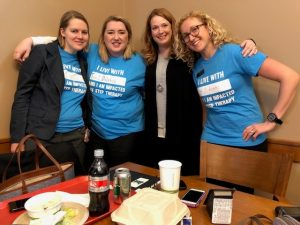
We’ve also worked to increase access and improve affordability of medication and services by supporting legislation that:
- Prohibits cost-sharing for preventive services
- Prohibits agreements that prevent pharmacies from charging patients the lowest price for their prescriptions due to clawback agreements
- Limits out-of-pocket costs for medication
- Sets evidence-based protocols that reduce obstacles to getting the medications prescribed for them
In addition to these important wins, the ADA has worked in states across the country to protect health care for our most vulnerable population: People who are receiving their benefits through a state Medicaid program. We’ve defeated legislation and regulation that would impose work and community engagement requirements in state Medicaid programs because we believe these requirements could create a barrier for people with diabetes to access health care. We have also worked in collaboration with other organizations to expand Medicaid eligibility in states and improve Medicaid programs for people with diabetes and prediabetes by adding coverage for diabetes self-management education (DSME), continuous glucose monitors (CGM), and by increasing access to the National Diabetes Prevention Program (NDPP). As a result of our collective advocacy efforts, state policymakers were able to understand that by adding these benefits their state’s financial resources can be utilized in the best way—by preventing and delaying diabetes for those with prediabetes, and by offering better management tools for those with diagnosed diabetes.
Our work hasn’t been limited to health care; we’ve also achieved significant wins in our other priority areas, including securing new and maintaining existing state budget allocations for diabetes prevention programs, securing budget allocations and passing legislation aimed at increasing access to healthy foods in communities with food deserts, and requiring free and reduced-price meals for students in high-poverty school districts. ADA staff and advocates are also engaging in legislation aimed at making the healthy choice the easy choice by supporting local and state-level legislation that requires bundled kids’ meals to have a healthy beverage and working to improve standards for physical activity and physical education in schools. What’s more, the ADA sponsored legislation in Arizona and Indiana that requires those states to prepare diabetes action plans to assess the burden of diabetes in their states and develop policy recommendations that state legislators can implement to reduce that burden. Over time, the ADA has worked to help pass this state coordination on diabetes legislation in more than 30 states, and we’re happy to add these two new states to that list.
Finally, the ADA recently celebrated a victory in New York, where we worked with other organizations to defeat legislation that would have required mandatory clinician-reporting and self-reporting of conditions that might cause lapse of consciousness or unawareness to the Department of Motor Vehicles. The ADA opposes discriminatory blanket policies like this that mandate reporting.
Our efforts are far from over as ADA staff and advocates continue to work on legislation and regulation in states with active legislative sessions. We’re counting on everyone’s help to get these final bills and proposals across the finish line. For a complete list of state legislation, please feel free to contact Lisa Murdock, Vice President, State Government Affairs at lmurdock@diabetes.org.
Legal Advocacy
The first half of 2018 was a busy one with litigation activity, Safe at School training and education, and hundreds of people with diabetes receiving help from the ADA on discrimination matters.
Raising Our Voice
At the end of 2017, the federal court in the northern district of California who heard our lawsuit against the U.S. Army Child, Youth & School Services granted the Army’s motion to dismiss our lawsuit. After assessing the court’s decision and considering our options, we appealed the decision to the U.S. Court of Appeals for the Ninth Circuit. In late June, we filed our opening brief and received the support of 32 organizations that signed onto three amicus (friend of the court) briefs. These organizations included AARP, AARP Foundation, ACLU, American Association of Diabetes Educators, Animal Legal Defense Fund, Autistic Self-Advocacy Center, Bay Area Legal Aid, Child Care Law Center, Children with Diabetes, Civil Rights Education and Enforcement Center, Council of Parent Advocates and Attorneys, Disability Rights Education & Defense Fund, Endocrine Society, Epilepsy Foundation of America, Impact Fund, International Society for Pediatric and Adolescent Diabetes, Judge David L. Bazelon Center for Mental Health Law, Law Foundation of Silicon Valley, Legal Aid Association of California, Legal Aid at Work, Legal Aid Foundation of Los Angeles, Legal Services for Prisoners with Children, National Association for the Deaf, National Disability Rights Network, National Federation of the Blind, National Women’s Law Center, Pediatric Endocrine Society, Public Interest Law Project, Southern Poverty Law Center, T1D Exchange, The Arc of the United States, and Worksafe, Inc.
In early March, we filed a motion in federal court in Tennessee requesting permission to join a lawsuit filed by a group of incarcerated individuals with diabetes against the nation’s second largest private prison operator, CoreCivic. The suit alleges severely inadequate diabetes care to individuals with insulin-treated diabetes at the Trousdale Turner Correctional Facility. We are still awaiting a decision from the court on our motion to intervene.
In June, we joined the American Cancer Society, American Cancer Society-Cancer Action Network, American Heart Association, American Lung Association and National Multiple Sclerosis Society in filing an amicus brief in Texas v. U.S., a lawsuit brought by 20 Republican attorneys general in federal court in Texas challenging the constitutionality of the Affordable Care Act.
Supporting People with Diabetes
Demand continues to be high for legal advocate assistance, demonstrating the critical need in the diabetes community for quality, free legal assistance and information. During the first half of 2018, we handled 902 new requests for legal assistance from people facing discrimination. The Legal Advocate Program provides counseling, guidance, and resources to individuals facing discrimination at school, daycare, work, when interacting with law enforcement or in correctional facilities, and in public places.
We continue to learn about the positive impact of our work—recently, a family in Washington who was having difficulty registering their daughter for their zoned public school contacted us for help. The daughter has type 1 diabetes and the school did not have trained staff to provide care. Instead, the school was requiring the child to attend a different school with a full-time nurse. The family contacted the ADA for assistance and received a full legal consultation and advice about their daughter’s rights from one of our attorneys. Equipped with this guidance, the family successfully advocated for their daughter to attend her desired school. Recently, the family shared their experience, in their own words, here on our Diabetes Stops Here blog.
Educating families, advocates, health care professionals, and others about the legal rights of children with diabetes continues to be a hallmark of our Safe at School campaign. Crystal Jackson, Director, Safe at School, and Fran Cogen, MD, Interim Co-Chair and Director of Endocrinology and Diabetes at Children’s National Medical Center and member of the Safe at School Working Group, co-presented a Safe at School pre-conference workshop at the ADA PostGraduate Course in San Francisco in February. A free continuing education program, the workshop focused on the legal protections of students with diabetes, resources, and case studies to help providers to advocate better on behalf of their pediatric patients. In addition to this workshop, Crystal and Fran teamed up for a two-part conversation about the Safe at School campaign, diabetes management in schools, and how to make it all work. You can read the conversation here (part 1) and here (part 2). In July, Crystal presented several sessions on Safe at School as a member of the faculty at the Children with Diabetes Friends for Life conference.
Grassroots & Internal Advocacy
Whether by responding to our action alerts, signing petitions, attending Call to Congress, joining advocacy webinar trainings, or signing up for Congress at Home, Diabetes Advocates lead with passion, commitment, and dedication in their efforts to stand up for those living with or impacted by diabetes.
Taking Action
The spring and summer have proven to be a busy time for both calls to action and overall advocate engagement, with nearly 20 calls to action—split evenly across both state-based and federal issues—deployed since April alone. Diabetes Advocates raised their voice time and again to ensure our message about the critical need to support people with diabetes is received by the nation’s lawmakers. While alerts have asked advocates to engage lawmakers using traditional methods, like email, we recently began integrating social media messaging and engagement options into calls to action. This method is empowering advocates to use different platforms to communicate with their elected officials and is making it easier for advocates to take action. We are also pleased that this approach will help to expand the reach and visibility of diabetes advocacy across social media platforms more generally, equating to greater public awareness of the impact of diabetes and the opportunities to engage directly in diabetes advocacy.
Empowering Advocates – Grassroots Advocacy Webinars
Our Advocates in Action activities for the second quarter of 2018 included three webinars, all of which are now available online. Our April Advocates in Action webinar, Partnering for Health Equity: Diabetes Advocacy, aligned with the Health and Human Services Office of Minority Health’s 2018 April Minority Health month theme, Partnering for Equity. Participants learned from key staff and coalition partners about how the ADA works with partners to address barriers to health equity at all levels, including: The Special Diabetes Program for Indians, case studies from recent state legislative efforts, the Screen at 23 Campaign for Asian Americans, and an organizational update about the work of the Community Integrated Health Strategy Team.
In June, we hosted two broadcasts of a webinar developed for parents of children with diabetes, Kids with Diabetes: How ADA Helps. Parents heard first-hand from a pediatric psychologist, other parents, and from a teen living with diabetes about how the ADA makes a difference for kids with diabetes, including: supporting for federal funding of research, ADA’s Standards of Care, resources for newly diagnosed families, ADA Camps, advocates for affordable health care access, insulin affordability, and more.
June also marked the beginning of our Congress at Home campaign, the ADA’s initiative to ensure that senators and representatives hear from advocates during the August congressional recess. Interested Diabetes Advocates can now easily sign up to access resources on our new webpage. We kicked off the annual campaign with the broadcast of the first in a two-part series webinar, Take Advantage of Your Opportunity to Raise Voice at Home! Participants learned about our asks for the 2018 Congress at Home visits, and about ADA resources and support to help them secure meetings. The second webinar, Congress at Home Prep Webinar 2: Priority Messaging, Policy Asks & the Very Latest from Capitol Hill, was held July 24, and will be viewable online (on the page featuring 2018 webinars) by July 30.
Insulin Affordability
We are pleased to share that the insulin affordability petition has garnered more than 355,000 advocate signatures, including the addition of more than 45,000 signatures in the first half of 2018 alone. Surpassing 350,000 signatures is both a massive benchmark and a symbol of what has proven to be one of, if not THE, most compelling advocate recruitment and engagement strategies to date. ADA staff is currently in the process of developing an ongoing engagement strategy specific to insulin affordability to mobilize advocate interest and passion. As always, the advocacy strategy will continue its foundational approach to further inform policymakers and the public at large about the staggering impact of this issue and critical need for resolution.
Congress at Home
Work on Congress at Home began in early June when Diabetes Advocates across the nation were invited to join the ADA in our annual initiative to meet with members of Congress while home during the August recess. As always, all advocates were welcomed to participate in Congress at Home and can do so by signing up and issuing personal invitations to their congressional members for a meeting in the community while on recess. In addition to the broad call for engagement, this year we launched several new strategies to maximize our success. One such strategy was the issuing of the first ever ADA Congress at Home invitation sent directly to key members of Congress encouraging them to join Diabetes Advocates for a meeting in their community as a part of Congress at Home. While not every member of Congress received an ADA invitation, those who did were chosen based on committee assignment, expressed interest in ADA priorities during the 2018 Call to Congress meeting, and other reinforcing factors enabling support for advocate goals. The ADA invitation was sent to reinforce invitations sent by Diabetes Advocates and to create a tool for follow-up and support by ADA staff. Of the more than 50 ADA-issued invitations, dozens of congressional offices responded with interest in scheduling a meeting with Diabetes Advocates. Early indications suggest these new strategies will yield positive results for this year’s initiative.
As the August recess nears, we are encouraged by the interest and engagement in Congress at Home on the part of both congressional members as well as Diabetes Advocates. Every year we look forward to Congress at Home as an opportunity for advocates to cultivate deeper relationships and discuss ways in which lawmakers can be more supportive.
What’s Around the Corner?
We are excited to continue engaging Diabetes Advocates with multiple webinars and new initiatives slotted for this fall. In particular, we are looking forward to launching coordinated advocacy efforts geared at candidate education. This initiative will help advocates to establish solid foundational knowledge about the impact of diabetes and cultivate trusted relationships with new policymakers at the onset of a new term in office. To support advocates in this effort, we will be hosting a webinar on Wednesday, September 12 at 4:00 p.m. ET to train Diabetes Advocates on how to effectively and appropriately engage candidates for public office to educate them about the impact of diabetes and the critical need for their support during and after their bid for office. Specifically, the webinar will cover the legal guidelines around candidate outreach and education, the value of relationships with an ultimate goal of cultivating champions, opportunities for meetings and outreach, and what happens after the election. Be sure to save the date and join us for this important discussion.
“Raise Voice” is one of the ADA’s three strategic mission pillars, and our grassroots advocacy efforts—including recruiting, empowering, and mobilizing advocates—are critical to our success. Thus far, 2018 has brought nonstop challenges and opportunities at both the state and federal level. What has carried us through and what will always move us closer to achieving our mission is compelling and timely grassroots advocacy engagement. There is nothing more powerful than the voices and stories of our advocates—we are grateful for the incredible passion and commitment of advocates like you!
Public Policy
Medicare
Although we continue to see elements of the Affordable Care Act being chipped away and discarded, recently we have found some positive trends in Medicare. On the regulatory front we continue to work with stakeholders to help ensure Medicare recipients with diabetes have access to the technology and services they need.
Medical technology is constantly changing and advancing to allow patients to receive the best possible care. However, technology is often far ahead of the regulatory process. We have seen this specifically in the advancement of Continuous Glucose Monitors (CGM). Although the Centers for Medicare & Medicaid Services (CMS) approved therapeutic CGM devices for Medicare coverage in January of 2017, if the CGM was used in conjunction with a smart device, such a as a smartphone, smart watch, or tablet, Medicare would not cover it. For many individuals with diabetes who are blind or have low-vision, the accompanying app in a smart device enables them to use CGM. For others, pairing CGM with a smart device allows individuals with diabetes to share glucose data with caregivers and family. The Medicare policy that excluded coverage for CGM if used in conjunction with a smart device created an unnecessary barrier for Medicare beneficiaries to access and continue to use CGM in the way they—and their health care provider—determined to be appropriate.
In June, we were pleased to see that CMS listened to our feedback and feedback from other stakeholders and modified the coverage policy to include the use of CGMs in conjunction with a smart device. This is a huge win for Medicare recipients with diabetes, as well as for the future of emerging technologies for the diabetes community.
Also under the Medicare umbrella, Diabetes Self-Management Training (DSMT) has come to the forefront in both the legislative and regulatory arenas. Although DSMT has demonstrated significant benefits for individuals with diabetes—improved diabetes knowledge, improved self-care behaviors, lower A1C, lower weight, improved quality of life, healthy coping, and lower costs—only 5% of Medicare beneficiaries with newly diagnosed diabetes use DSMT services. After months of working closely with the ADA and other diabetes stakeholder organizations, this May, Representative Reed introduced a bill in the House of Representatives titled “Expanding Access to Diabetes Self-Management Training Act of 2018” (HR 5768). The bill would increase the number of DSMT hours covered by Medicare, remove cost-sharing, allow DSMT services be fulfilled in a non-hospital setting, and remove additional restrictions relating to coverage.
On the regulatory front, we are working closely with the Department of Health and Human Services (HHS) to identify and address barriers to the uptake of DSMT in rural populations. Our priorities include, but are not limited to, the reduction or removal of cost-sharing, implementing coverage for a virtual program, and expanding access beyond the outpatient hospital setting. It is our hope that by addressing these issues in multiple forums, the barriers to DSMT will crumble and more Medicare beneficiaries will have access to the care they need.
From:: http://diabetesstopshere.org/2018/07/23/government-affairs-advocacy-newsletter-update-july-2018/
